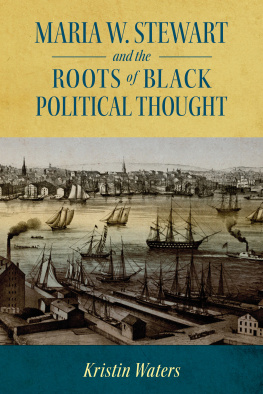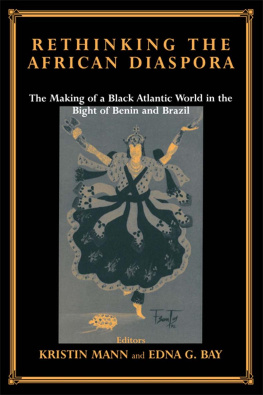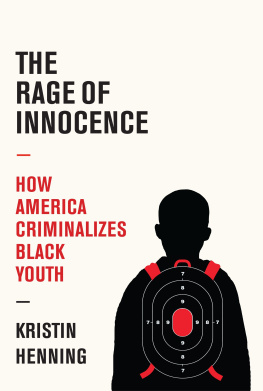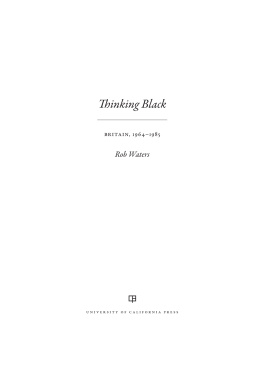
Published by University Press of New England,
One Court Street, Lebanon, NH 03766
2007 University of Vermont Press
All rights reserved
Printed in the United States of America
For permission to reproduce any of the material in this book, contact Brandeis University Press, 415 South Street, Waltham, MA 02453, or visit brandeisuniversitypress.com
ISBN for the ebook: 978-1-68458-115-3
Library of Congress Cataloging-in-Publication Data
Black womens intellectual traditions : speaking their minds / edited by Kristin Waters and Carol B. Conaway.
p. cm.
Includes bibliographical references and index.
ISBN-13: 978-1-58465-633-3 (cloth : alk. paper)
ISBN-10: 1-58465-633-6 (cloth : alk. paper)
ISBN-13: 978-1-58465-634-0 (pbk. : alk. paper)
ISBN-10: 1-58465-634-4 (pbk. : alk. paper)
1. African American womenIntellectual life19th century. 2. African American womenBiography. 3. African American intellectualsBiography. 4. African American womenPolitical activityHistory19th century. 5. African AmericansPolitics and government19th century. 6. African American philosophy. 7. FeminismUnited StatesHistory19th century. I. Waters, Kristin. II. Conaway, Carol B.
E185.86.B5445
305.48896073009034dc22 2006035257
has been reprinted in its entirety from Introduction in Maria W. Stewart: Americas First Black Woman Political Writer, edited and introduced by Marilyn Richardson (Bloomington: Indiana University Press, 1987).
has been reprinted from Hazel V. Carby, Reconstructing Womanhood: The Emergence of the Afro-American Woman Novelist (New York: Oxford University Press, 1987): 4061.
has been reprinted from Carla L. Peterson, Doers of the Word: African-American Women Speakers and Writers in the North (18301880). By permission of Oxford University Press, Inc.
has been reprinted from Anna Julia Cooper, Introduction in A Voice from the South, edited and introduced by Mary Helen Washington (New York: Oxford University Press, 1988): xxviiliv.
: Joy James, Shadowboxing: Representations of Black Feminist Politics, 2002, PALGRAVE reproduced with permission of Palgrave Macmillan.
: Republished with permission of Routledge, from Black Feminist Thought: Knowledge, Consciousness, and the Politics of Empowerment, Patricia Hill Collins, 2000; permission conveyed through Copyright Clearance Center, Inc.
: 2004, The Haworth Press, Binghamton, N.Y. Black Feminist Theory: Charting a Course for Black Womens Studies in Political Science, Women and Politics 26 vol. 2, pp. 8193.
Dedicated to our mothers,
Shirley Barnard Waters and Aunita Napper Conaway
ACKNOWLEDGMENTS
This collection of writings honors and acknowledges the nineteenth-century black women who courageously gave voice to their views against all efforts to silence them, and the twentieth- and twenty-first-century women whose works are collected here, who bring these ideas to voice again.
We would like to acknowledge and thank the University of New Hampshire and the Dean of the College of Liberal Arts, Marilyn Hoskin, as well as Thomas McNamara and Steve Bostic of the Worcester State College Foundation Board for supporting this research. We would also like to thank the UNH Center for the Humanities and its director, Burt Feintuch, for Carol Conaways Faculty Fellowship Award. A special note of thanks goes to Mara Witzling and Linda Blum, coordinators of the UNH Womens Studies Program, and to Larry Prelli, chair of the UNH Department of Communication, for their sound counsel and support.
The careful comments of our reviewers, Lewis R. Gordon, Gertrude Gonzalez de Allen, and Charles Mills, helped to shape this volume. The Caribbean Philosophical Association has provided a comfortable space for discourse about Africana philosophy for many people who otherwise might find few places for discourse in this vital field.
We are extremely grateful to Diane Bell, Ann Bookman, Marla Brettschneider, Cynthia Enloe, Debbie Fisher, Julie Frechette, Rick Friedman, SunHee Gertz, Lewis and Jane Gordon, Marlene Karas, Ken Marshall, Dan Shartin, and Karen Turner for their astute criticisms, ongoing intellectual conversations, friendship, and generosity. Our editor, Ellen Wicklum of University Press of New England, has provided welcome encouragement throughout the project.
We are grateful to Don Vescio for his crucial technological assistance. We appreciate the clerical assistance of Samantha DOrtona, Lu Houde, and Melanie Wilcox. For keeping body and soul together, we thank Doris Worcester and Jane Anable.
Kris would like to thank Carol, who has been an enduring friend, teacher, and stalwart editor. She honors her children, Jiaqi and Colin, for their sustaining presence and is very grateful for the quiet support provided by Ed OReilly. The care and encouragement of her parents, George and Shirley Waters, are very much appreciated. Her sister, Nancy Waters, never fails to provide friendship and support.
Carol extends special thanks to Suzanne V. Armstrong for her wisdom and encouragement, to Cicely Stetson for her proofreading, cheerleading, wisdom, and unending support that were always available and generously given, and to Kristin for her support, generosity, encouragement, and friendship at every stage in the development of this project.
Finally, Carol would like to acknowledge the memory of her parents, Carl and Aunita Napper Conaway, and grandparents, the Reverend Robert O. and Bertha Scott Napper, and Carl and Ada Taylor Conaway who, despite enduring horrible racism, led lives of accomplishment and distinction. Out of the ashes of slavery and degradation, a young child was expected to be the hope of her family. Their enormous sacrifices, devotion, and unending inspiration and faith in her inspired her to walk in their footsteps.
Introduction
CAROL B. CONAWAY AND KRISTIN WATERS
I ask no monument, proud and high,
To arrest the gaze of passer-by,
All that my yearning spirit craves,
Is bury me not in a land of slaves.
Frances E. W. Harper, Bury Me in a Freeland
Far from being buried in a land of slaves, Frances E. W. Harper was buried in Eden. As editors, we discovered in preparing this anthology that Harper is buried in Eden Cemetery, just outside Philadelphia, the oldest black-owned cemetery in the United States. When we stumbled across this small fact, we were momentarily stunned. Many members of the national black intellectual and cultural elite, including William Still, Father of the Underground Railroad, and contralto Marian Anderson join Harper there. But also buried in Eden cemetery are Carols maternal grandparents, Reverend Robert Oliver Napper and Bertha Scott Napper, and when we learned that Harper shared the same burial place, we were deeply moved at the symbolic significance of this coincidence. Her biographer, Frances Smith Foster, calls Harper the best known and best loved poet of her time, and I. Garland Press called her the journalistic mother... of so many brilliant young women writers. And yet how many of us, like Carol, might have walked past Harpers grave and not known her legacy? This anthology is a step toward reclaiming the legacies of Harper and other nineteenth-century black women whose lives we otherwise might have walked past without knowing and appreciating their remarkable contributions to the traditions of black thought.
Black womens intellectual traditions in North America span almost four centuries. Their voices range as far and as deep as the more well-rehearsed contemporary ones, but one may have to listen especially carefully to hear them. These traditions have been transmitted orally and in writing, through religious teachings, speeches and texts, domestic arts and everyday activities. From before the formation of the nation, poetry and song conveyed beliefs about power and resistance, as well as particular notions of community and spirituality, family and labor. As literary critic Barbara Christian observed in 1990, My folk... have always been a race for theorythough more in the form of the hieroglyph, a written figure which is both sensual and abstract, both beautiful and communicative.












